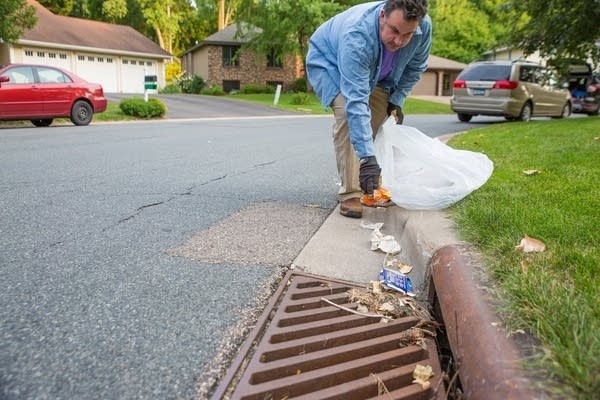Volunteers sought to 'adopt,' clean storm drains

Go Deeper.
Create an account or log in to save stories.
Like this?
Thanks for liking this story! We have added it to a list of your favorite stories.
Most Minnesotans are familiar with the Adopt-a-Highway program, where volunteers commit to picking up trash along a stretch of highway twice a year.
That same concept is now being applied to storm drains, which carry rain and runoff water — along with leaves, gravel, garbage and other debris — directly to rivers and lakes.
The Adopt-a-Drain program started in 2014 as a pilot project in St. Paul's Como neighborhood. Now, a coalition of water organizations is expanding it to include the seven-county metro area and Rochester.
Jana Larson, program director with Clean Water Minnesota, said the aim is to get volunteers to keep storm drains free from anything that can end up polluting lakes and rivers.
Turn Up Your Support
MPR News helps you turn down the noise and build shared understanding. Turn up your support for this public resource and keep trusted journalism accessible to all.
"Most people clean their drain about twice a week. It can take anywhere from five to 10 minutes," Larson said. "So it's not a huge commitment, but cumulatively, it has a huge impact."
Larson said many people don't realize that everything in the street ends up in storm drains, and usually goes untreated into a river or lake. Keeping storm drains clear also helps reduce local flooding, she said.
Leaves are full of organic matter and nutrients like phosphorus. When they end up in a city storm drain, those nutrients get carried to a river or lake.
"When they wash in such a large volume in our local waterways and then decompose, they actually feed the algae," Larson said. "That's why so many of our lakes and rivers are turning green."
Volunteers can get more information or sign up online here.
Larson says so far, about 3,000 people have signed up. There are roughly 350,000 storm drains in the Twin Cities, she said.
Rachel Hanks and her husband have been cleaning four storm drains on their block near St. Paul's Lake Phalen for more than two years.
Hanks said they go out with shovels, a rake or broom and a wheelbarrow about six times a year, or whenever there's a rainstorm in the forecast. They typically collect three garbage bags weighing 40 to 60 pounds each of leaves, grass clippings, gravel, trash and animal waste.
Hanks said she's happy the program is being expanded, and hopes it raises awareness of the importance of keeping storm drains clean to protecting water.
"When we were talking about this to people, many people believe that there's some filtration that happens before it gets into our lakes and rivers, but there isn't," she said.


